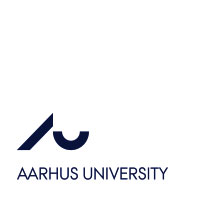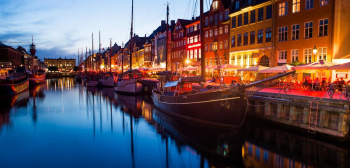奥胡斯大学

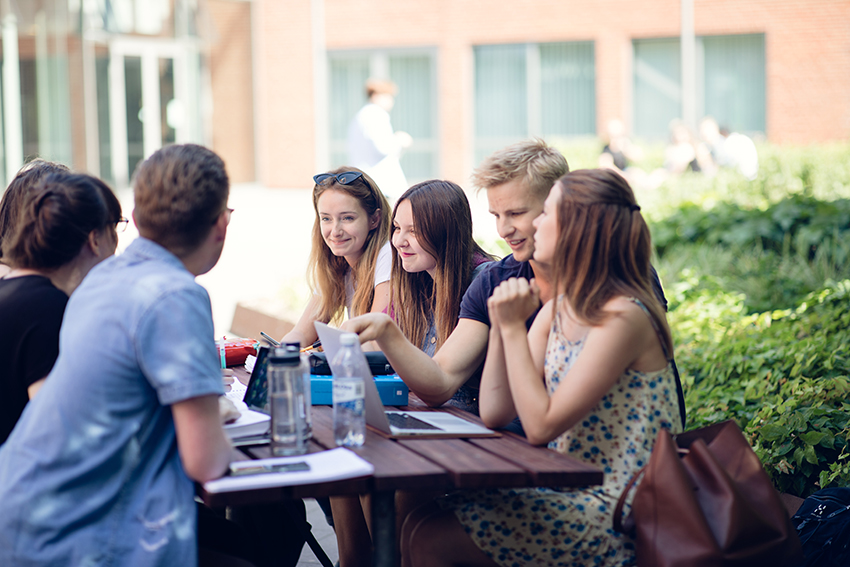
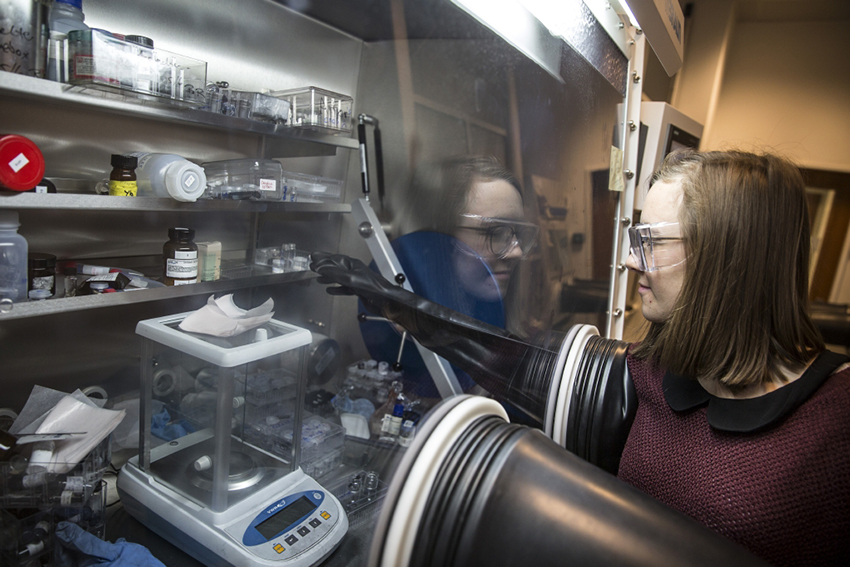


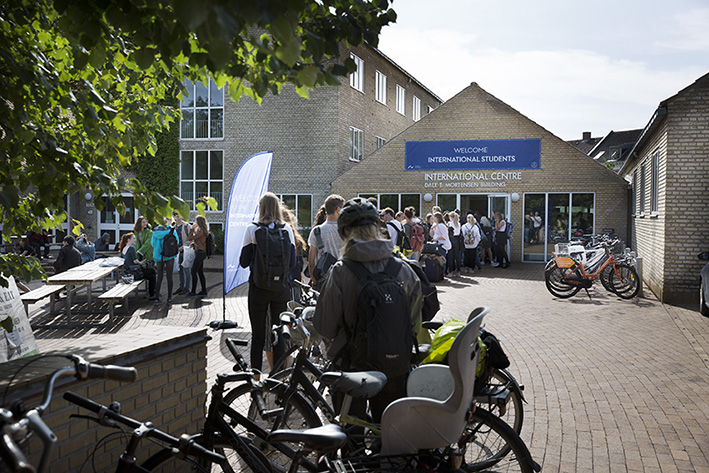







































About
Aarhus University in Denmark
Aarhus University is more than just a Top 100 university with research-based teaching and numerous programmes in English. It is a community.
A community of Danes and internationals
As an international student at Aarhus University, you will never be alone. You will be part of a group of more than four thousand international students, representing 120 nationalities. At the same time, the university and your fellow Danish students, all of whom speak fantastic English, are ready to help you feel safe and welcome in your new home country.
A community in the city
Students at Aarhus University benefit from the strong connection between the university, the city, and its many international businesses that support their study possibilities and opens the way to a successful future career.
A community of staff and students
Studying at Aarhus University means taking research-intensive courses, all taught by active researchers. The study environment is informal, and the open and critical discussions between students and professors make for a very exciting and dynamic learning experience. Many former students have told us how much they appreciate that the professor’s door is always open and their teachers are always ready to help them succeed in their studies.
These – and the fact that students have access to amazing facilities – are some of the reasons why former and current international students chose Aarhus University.
Why choose Aarhus University?
- Top 100 university - Aarhus University is consistently ranked as one of the world’s top universities. It was ranked number 65 in the 2018 Shanghai ranking.
- Study in English - Aarhus University offers more than 50 complete programmes in English at Bachelor and Master’s level. Furthermore, all PhD programmes are in English.
- Research-based teaching, where teachers are active researchers and teaching takes place in an informal context. All programmes are deeply rooted in research and are reviewed on an ongoing basis to meet the highest national and global quality standards.
- World Class research - in the last 25 years, two researchers from Aarhus University have won Nobel Prizes. Jens Christian Skou was awarded the prize in Chemistry 1997 and Dale T. Mortensen was awarded the prize in Economics in 2010. More than 35 researchers have been awarded ERC grants since 2007
- Aarhus University’s School of Business and Social Sciences (BSS) is accredited by AACSB, AMBA, and EQUIS for the school’s core business activities. This means that BSS is a Triple Crown accredited business school.
- Favorable tuition fees - tuition is free for EU, EEA and Swiss citizens. For other students, the tuition fee rates are highly competitive. They are set annually and can be found online.
- English – no problem - Danes were recently ranked among the best non-native English speakers in the world, so it is easy for international students to get along in Denmark even if they don’t speak Danish.
- Safe, secure, equal - Denmark is widely cited as one of the world’s most liveable places. It has the world’s highest level of income equality according to the OECD.
ON CAMPUS FACILITIES
Aarhus University Libraries
AU Library has 19 locations around the different campuses. Some are open to students and staff 24 hours a day and offer spacious reading rooms. All libraries and AU buildings offer free internet. The main library of the university is the Royal Danish Library, and almost every department has its own specialised libary. All university libraries are on the same borrowing system and along with an extensive electronic journal database, the Royal Danish Library subscribes to all major newspapers around the world.
Aarhus University Sports (AUS)
The AUS is open to all university students and organises a wide range of activities, from badminton to fencing to chess.
Student counsellors
Student counsellors are senior students who are there to advise other students in their department. This is the first place to go when students have questions regarding anything to do with their studies at the university.
Canteen service
There are numerous canteens located on all AU campus locations.
Student Advisory Office
This group of social workers and psychologists assists students with personal matters.
This service is free of charge and completely confidential.
Dale’s Café
Dale’s Café is a meeting place for international students and the university’s many PhD students. The café, which is located next to the International Office in the Dale T. Mortensen Building, offers quality coffee and sandwiches. It has an informal lounge area where students and young researchers can relax while enjoying snacks and beverages.
Friday Bar
The Friday bars are a good opportunity for students to meet and enjoy a drink together. Every Friday around 2 pm, each department sets up a small bar in a canteen or a classroom serving beer and soft drinks.
CAMPUS LIFE
The main campus at Aarhus University is located in the centre of Aarhus. Though students will be enrolled at a particular department, they will also feel that they are part of the university as a whole. The campus provides a unique and dynamic study environment which influences both the academic and social environments. Students from different departments meet in the Friday bars, at Studenterhus Aarhus, at concerts in the University Park and around the rest of the city.
STUDY AND TEACHING ENVIRONMENT
Active participation in class
Most courses use a combination of large lectures and smaller classroom-based seminars. In the seminars, you are expected to participate, for instance by asking questions, taking part in discussions or giving presentations. Critical thinking and freedom of speech are important at Aarhus University, and it is okay not to share all of your lecturer’s opinions.
Study methods at AU and in Denmark
While course work activities count as part of the final examination grade for most courses, there are rarely visible checkups (e.g. roll calls) on your presence in class. This leaves you with a high degree of freedom to be matched by your own responsibility and self-discipline. Please also note that in some courses class attendance is actually a pre-requisite for participating in the exam. Danish higher education is characterised by an analytical approach. Students are thus not only expected to accumulate and reproduce knowledge but also to compare, analyse and evaluate on an individual basis.
Most courses are followed by both Danish and international students. We hope that the classroom environment will pave the way for social interaction between international and Danish students.
Classroom Culture
As an international student or researcher, you may be surprised by the study culture at Aarhus University. The study culture Denmark is informal, and the hierarchy between lecturers and students is flat and not very strict.
Rather than Ms., Mrs., Mr., Dr. or Professor, most lecturers will ask you to call them by their first name, and students and lecturers are typically on first name terms. Professors and other staff members often chat informally with the students and socialise with them during breaks.
LIVING IN AARHUS - DENMARK'S #1 STUDENT CITY
The university’s main campus is located in Aarhus. From here, beach, harbour, and forest are all within a fifteen-minute bike ride.
With a Top 100 university right in the heart of town, Aarhus is swarming with students. The city is full of opportunities aimed at young people. Concerts, museums, nightlife and shopping (as well as the dorms) are all within walking distance.
Down on the harbour, Aarhus boasts the largest public library in Scandinavia, Dokk1 – a cultural centre offering a modern, functional and visually stunning experience.
Aarhus is known as Denmark’s culinary capital and has four Michelin-starred restaurants. There are dining opportunities everywhere and for every budget – from cosy cafés in the Latin Quarter to the modern restaurants in the central shopping area.
Welcome to Denmark’s number one student city!
On our website, you can find student profiles that will give you an authentic taste of student life at Aarhus University – told by our current students to you and other prospective students.
Learn about how they chose their degree programme and how they experienced the leap from upper secondary school to university, get good advice about living well on a tight budget, and catch a glimpse of their everyday life at Aarhus University.
See more here: https://international.au.dk/education/meetau/meetstudents/
For admission requirements for each individual programme please see the webpage for each programme.
A number of programmes have limited intake, which means that only the best among the qualified applicants will be selected for admission.
English-language requirements
All applicants with a non-Danish qualifying examination or Bachelor’s degree must document their English-language qualifications.
The level can be documented with, for example, a TOEFL test – minimum 560 (paper-based) or 83 (internet-based) – or an IELTS test with a minimum of 6.5 points. See tests and minimum scores here: http://kandidat.au.dk/en/admission/admission-requirements/
Application process
For our Master’s programmes, the application portal opens in November.
The deadline to apply is 15 January for non-EU/EEA/Swiss and 1 March for EU/EEA/Swiss
(Please note that it is possible to upload documentation that you have completed your Bachelor’s degree at a later stage and also your English language test)
For Bachelor’s programmes, the deadline to apply is 15 March at noon (CET).
Commencement of studies is around 1 September.
Please note that a few of our programmes have commencement of studies twice a year – for programmes starting in Winter the application deadline is 15 September 2019.
Further information on how to apply can be found here: https://international.au.dk/education/apply/
DURING YOUR STUDIES
Many students in Denmark take student jobs or part-time jobs while they study at university. As an international student at Aarhus University, you are free to use our database for part-time jobs and student jobs: jobbank.au.dk
AFTER YOU GRADUATE
For Aarhus University graduates, there are many possibilities after university. In Denmark, The unemployment rate is currently about 5 percent. In 2018 we asked AU classes from 2015–2017 about their employment status and 90 percent had a job.
Our career centres at the Faculty of Arts and at Aarhus BSS are available to offer guidance. They also host events specifically for internationals.
WHERE DO GRADUATES WORK?
AU graduates work in hundreds of different companies and organisations on a host of different career paths. Most students find work in Denmark, but around 10 percent choose to work abroad.
As an international student, it helps to know the Danish language and Danish culture if you wish to find a job in Denmark after your studies.
Here are the top six companies employing the most AU graduates according to LinkedIn:
• Aarhus University Hospital
• Danske Bank
• Novo Nordisk
• Arla Foods
• Vestas
• LEGO Group
About
Aarhus University in Denmark
Aarhus University is more than just a Top 100 university with research-based teaching and numerous programmes in English. It is a community.
A community of Danes and internationals
As an international student at Aarhus University, you will never be alone. You will be part of a group of more than four thousand international students, representing 120 nationalities. At the same time, the university and your fellow Danish students, all of whom speak fantastic English, are ready to help you feel safe and welcome in your new home country.
A community in the city
Students at Aarhus University benefit from the strong connection between the university, the city, and its many international businesses that support their study possibilities and opens the way to a successful future career.
A community of staff and students
Studying at Aarhus University means taking research-intensive courses, all taught by active researchers. The study environment is informal, and the open and critical discussions between students and professors make for a very exciting and dynamic learning experience. Many former students have told us how much they appreciate that the professor’s door is always open and their teachers are always ready to help them succeed in their studies.
These – and the fact that students have access to amazing facilities – are some of the reasons why former and current international students chose Aarhus University.
Why choose Aarhus University?
- Top 100 university - Aarhus University is consistently ranked as one of the world’s top universities. It was ranked number 65 in the 2018 Shanghai ranking.
- Study in English - Aarhus University offers more than 50 complete programmes in English at Bachelor and Master’s level. Furthermore, all PhD programmes are in English.
- Research-based teaching, where teachers are active researchers and teaching takes place in an informal context. All programmes are deeply rooted in research and are reviewed on an ongoing basis to meet the highest national and global quality standards.
- World Class research - in the last 25 years, two researchers from Aarhus University have won Nobel Prizes. Jens Christian Skou was awarded the prize in Chemistry 1997 and Dale T. Mortensen was awarded the prize in Economics in 2010. More than 35 researchers have been awarded ERC grants since 2007
- Aarhus University’s School of Business and Social Sciences (BSS) is accredited by AACSB, AMBA, and EQUIS for the school’s core business activities. This means that BSS is a Triple Crown accredited business school.
- Favorable tuition fees - tuition is free for EU, EEA and Swiss citizens. For other students, the tuition fee rates are highly competitive. They are set annually and can be found online.
- English – no problem - Danes were recently ranked among the best non-native English speakers in the world, so it is easy for international students to get along in Denmark even if they don’t speak Danish.
- Safe, secure, equal - Denmark is widely cited as one of the world’s most liveable places. It has the world’s highest level of income equality according to the OECD.
ON CAMPUS FACILITIES
Aarhus University Libraries
AU Library has 19 locations around the different campuses. Some are open to students and staff 24 hours a day and offer spacious reading rooms. All libraries and AU buildings offer free internet. The main library of the university is the Royal Danish Library, and almost every department has its own specialised libary. All university libraries are on the same borrowing system and along with an extensive electronic journal database, the Royal Danish Library subscribes to all major newspapers around the world.
Aarhus University Sports (AUS)
The AUS is open to all university students and organises a wide range of activities, from badminton to fencing to chess.
Student counsellors
Student counsellors are senior students who are there to advise other students in their department. This is the first place to go when students have questions regarding anything to do with their studies at the university.
Canteen service
There are numerous canteens located on all AU campus locations.
Student Advisory Office
This group of social workers and psychologists assists students with personal matters.
This service is free of charge and completely confidential.
Dale’s Café
Dale’s Café is a meeting place for international students and the university’s many PhD students. The café, which is located next to the International Office in the Dale T. Mortensen Building, offers quality coffee and sandwiches. It has an informal lounge area where students and young researchers can relax while enjoying snacks and beverages.
Friday Bar
The Friday bars are a good opportunity for students to meet and enjoy a drink together. Every Friday around 2 pm, each department sets up a small bar in a canteen or a classroom serving beer and soft drinks.
CAMPUS LIFE
The main campus at Aarhus University is located in the centre of Aarhus. Though students will be enrolled at a particular department, they will also feel that they are part of the university as a whole. The campus provides a unique and dynamic study environment which influences both the academic and social environments. Students from different departments meet in the Friday bars, at Studenterhus Aarhus, at concerts in the University Park and around the rest of the city.
STUDY AND TEACHING ENVIRONMENT
Active participation in class
Most courses use a combination of large lectures and smaller classroom-based seminars. In the seminars, you are expected to participate, for instance by asking questions, taking part in discussions or giving presentations. Critical thinking and freedom of speech are important at Aarhus University, and it is okay not to share all of your lecturer’s opinions.
Study methods at AU and in Denmark
While course work activities count as part of the final examination grade for most courses, there are rarely visible checkups (e.g. roll calls) on your presence in class. This leaves you with a high degree of freedom to be matched by your own responsibility and self-discipline. Please also note that in some courses class attendance is actually a pre-requisite for participating in the exam. Danish higher education is characterised by an analytical approach. Students are thus not only expected to accumulate and reproduce knowledge but also to compare, analyse and evaluate on an individual basis.
Most courses are followed by both Danish and international students. We hope that the classroom environment will pave the way for social interaction between international and Danish students.
Classroom Culture
As an international student or researcher, you may be surprised by the study culture at Aarhus University. The study culture Denmark is informal, and the hierarchy between lecturers and students is flat and not very strict.
Rather than Ms., Mrs., Mr., Dr. or Professor, most lecturers will ask you to call them by their first name, and students and lecturers are typically on first name terms. Professors and other staff members often chat informally with the students and socialise with them during breaks.
LIVING IN AARHUS - DENMARK'S #1 STUDENT CITY
The university’s main campus is located in Aarhus. From here, beach, harbour, and forest are all within a fifteen-minute bike ride.
With a Top 100 university right in the heart of town, Aarhus is swarming with students. The city is full of opportunities aimed at young people. Concerts, museums, nightlife and shopping (as well as the dorms) are all within walking distance.
Down on the harbour, Aarhus boasts the largest public library in Scandinavia, Dokk1 – a cultural centre offering a modern, functional and visually stunning experience.
Aarhus is known as Denmark’s culinary capital and has four Michelin-starred restaurants. There are dining opportunities everywhere and for every budget – from cosy cafés in the Latin Quarter to the modern restaurants in the central shopping area.
Welcome to Denmark’s number one student city!
On our website, you can find student profiles that will give you an authentic taste of student life at Aarhus University – told by our current students to you and other prospective students.
Learn about how they chose their degree programme and how they experienced the leap from upper secondary school to university, get good advice about living well on a tight budget, and catch a glimpse of their everyday life at Aarhus University.
See more here: https://international.au.dk/education/meetau/meetstudents/
For admission requirements for each individual programme please see the webpage for each programme.
A number of programmes have limited intake, which means that only the best among the qualified applicants will be selected for admission.
English-language requirements
All applicants with a non-Danish qualifying examination or Bachelor’s degree must document their English-language qualifications.
The level can be documented with, for example, a TOEFL test – minimum 560 (paper-based) or 83 (internet-based) – or an IELTS test with a minimum of 6.5 points. See tests and minimum scores here: http://kandidat.au.dk/en/admission/admission-requirements/
Application process
For our Master’s programmes, the application portal opens in November.
The deadline to apply is 15 January for non-EU/EEA/Swiss and 1 March for EU/EEA/Swiss
(Please note that it is possible to upload documentation that you have completed your Bachelor’s degree at a later stage and also your English language test)
For Bachelor’s programmes, the deadline to apply is 15 March at noon (CET).
Commencement of studies is around 1 September.
Please note that a few of our programmes have commencement of studies twice a year – for programmes starting in Winter the application deadline is 15 September 2019.
Further information on how to apply can be found here: https://international.au.dk/education/apply/
DURING YOUR STUDIES
Many students in Denmark take student jobs or part-time jobs while they study at university. As an international student at Aarhus University, you are free to use our database for part-time jobs and student jobs: jobbank.au.dk
AFTER YOU GRADUATE
For Aarhus University graduates, there are many possibilities after university. In Denmark, The unemployment rate is currently about 5 percent. In 2018 we asked AU classes from 2015–2017 about their employment status and 90 percent had a job.
Our career centres at the Faculty of Arts and at Aarhus BSS are available to offer guidance. They also host events specifically for internationals.
WHERE DO GRADUATES WORK?
AU graduates work in hundreds of different companies and organisations on a host of different career paths. Most students find work in Denmark, but around 10 percent choose to work abroad.
As an international student, it helps to know the Danish language and Danish culture if you wish to find a job in Denmark after your studies.
Here are the top six companies employing the most AU graduates according to LinkedIn:
• Aarhus University Hospital
• Danske Bank
• Novo Nordisk
• Arla Foods
• Vestas
• LEGO Group
Available programs
University highlights
- 2012#89
- 2014#91
- 2015#96
- 2016#107
- 2017#117
- 2018#119
- 2019#=141
- 2020#145
- 2021#147
- 2022#155
- 2023#161
- 2024#=143
- 2025#144
- 2026#131
Campus locations
Aarhus Campus,
Aarhus University , Aarhus , Denmark , 8000
Emdrup,
Tuborgvej 164 , Emdrup , Copenhagen , Denmark , 2400
Herning,
Birk Centerpark 15 , Herning , Denmark , 7400
Related content


